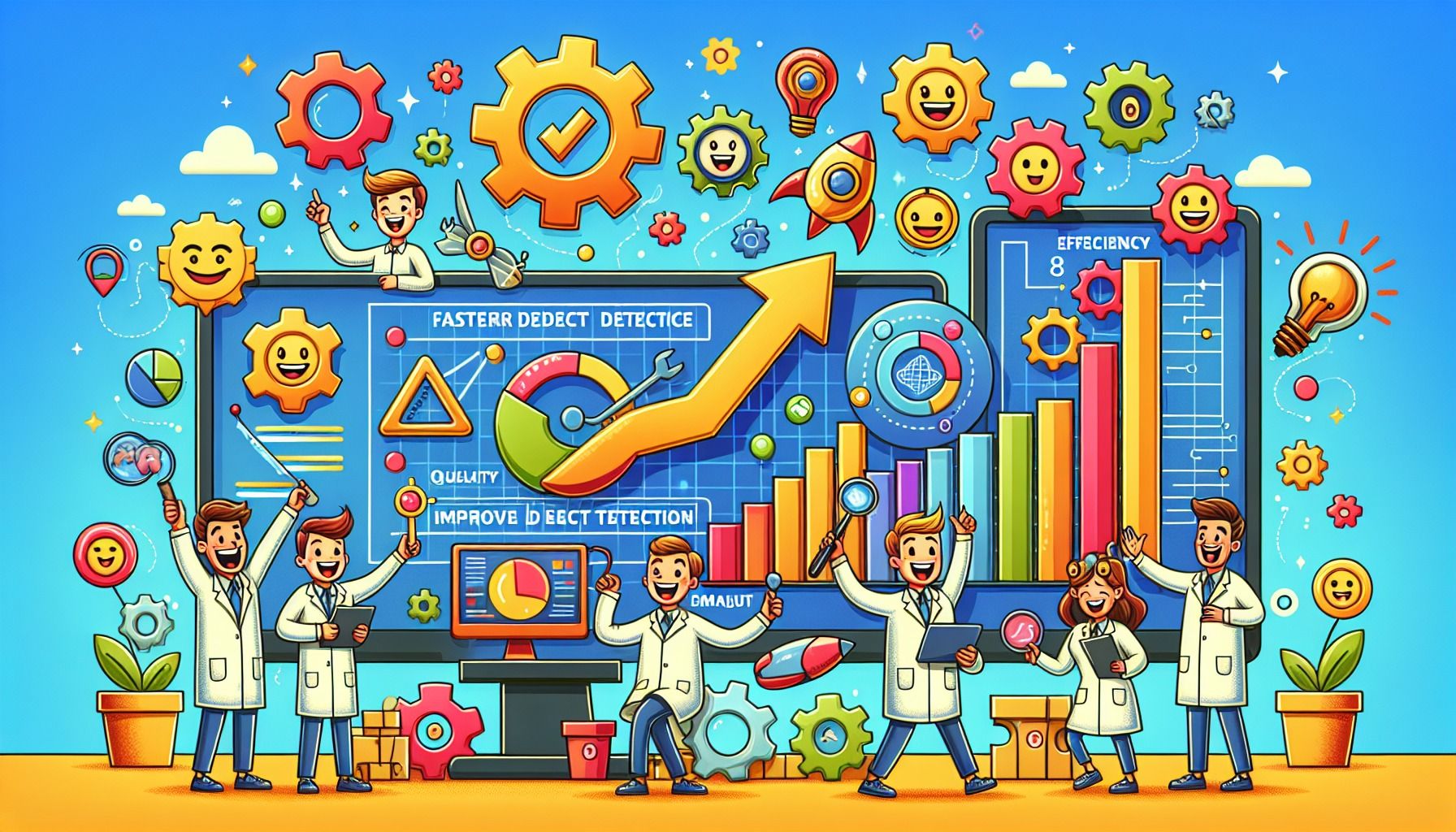- Key Takeaways
- Evolution of Quality Assurance
- The Role of AI in Modern Quality Assurance
- Benefits of Implementing AI in QA Processes
- AI Testing Frameworks and Platforms
- AI-Powered Testing Tools for QA Teams
- Autonomous Testing with AI
- Integrating AI into the Software Development Lifecycle
- Challenges and Considerations When Implementing AI in QA
- Future Trends in AI for Quality Assurance
- Real-World Applications: Case Studies of AI in QA
- Preparing Your QA Team for AI Adoption
- Ethical Considerations in AI-Driven Quality Assurance
- Summary
- Call to Action
- Frequently Asked Questions
Key Takeaways
- AI significantly enhances the efficiency, consistency, and scalability of quality assurance processes, allowing QA teams to focus on strategic tasks.
- Implementing QA AI leads to improved test coverage, faster testing cycles, and superior defect detection, ensuring higher software quality.
- Preparing QA teams for AI adoption requires ongoing training and a cultural shift, fostering a continuous learning environment to keep pace with technological advancements.
Evolution of Quality Assurance
From Manual Testing to Automation
The evolution of quality assurance has been a remarkable journey, transforming from manual testing to automation. In the early days of software development, manual testing was the norm. QA teams meticulously executed test cases by hand, a process that was not only time-consuming but also prone to human error. Manual testing required significant effort and resources, often leading to longer development cycles and delayed releases.As software applications grew in complexity, the limitations of manual testing became increasingly apparent. The need for faster, more efficient, and accurate testing processes drove the shift towards automation. Automation testing revolutionized the QA landscape by enabling teams to execute repetitive test cases quickly and consistently. This shift allowed QA teams to focus on more strategic tasks, such as test planning and analysis, rather than being bogged down by repetitive manual tasks.Automation testing also significantly increased test coverage. Automated test scripts could be run across multiple environments and configurations, ensuring that even the most complex and edge cases were thoroughly tested. This comprehensive approach reduced the risk of undetected defects and improved overall software quality. As a result, automation testing became an integral part of the software development life cycle, paving the way for the integration of AI in quality assurance.Limitations of Manual Testing and the Need for Change
Despite its importance, manual testing has several inherent limitations that have driven the need for change. One of the primary drawbacks is that it is time-consuming and labor-intensive. Human testers must execute each test case individually, which can be a slow and tedious process, especially for large and complex applications.Manual testing is also prone to human error. Even the most skilled testers can make mistakes, leading to inconsistencies and missed defects. This lack of consistency can compromise the reliability of the testing process and the quality of the software.Another significant limitation is the restricted test coverage. Manual testing can only cover a limited number of scenarios and configurations due to time and resource constraints. This limitation makes it challenging to thoroughly test complex applications and identify all potential defects.Additionally, manual testing incurs high maintenance costs. As software applications evolve, test cases must be updated and maintained to reflect changes in the codebase. This ongoing maintenance can be resource-intensive and costly.These limitations have underscored the need for more efficient and effective testing processes. The adoption of automation testing and AI-powered testing tools has addressed these challenges by enabling QA teams to test software applications more efficiently, accurately, and thoroughly. AI in quality assurance has further revolutionized the testing process by leveraging machine learning algorithms and natural language processing to enhance testing efficiency and accuracy.The Role of AI in Modern Quality Assurance

Benefits of Implementing AI in QA Processes

Enhanced Test Coverage
One of the most compelling benefits of QA AI in quality assurance is the significant enhancement in test coverage. Traditional manual testing methods, no matter how thorough, simply cannot match the level of coverage achieved by AI. AI-powered tools utilize machine learning algorithms to analyze vast amounts of data, including codebases, user interfaces, and APIs, to create comprehensive and optimized test scripts. This ensures that even the most complex and edge cases are thoroughly tested, reducing the risk of undetected defects.Generative AI further enhances test coverage by automatically generating test cases based on the analysis of the software’s internal states and external behaviors. This data-driven approach allows for continuous testing and adaptation to changes, ensuring that tests remain relevant and effective throughout the software development lifecycle.Expanding test coverage beyond the capabilities of manual testing, AI helps maintain high standards of software quality and reliability.Faster Testing Cycles
QA AI also plays a crucial role in accelerating testing cycles. Automating the generation and execution of test cases, AI significantly cuts down the time and effort required for testing activities. This leads to quicker release cycles and faster time-to-market, which is essential in today’s competitive software landscape. Generative AI can produce entire test suites without manual intervention, ensuring that tests are comprehensive and up-to-date.Moreover, AI tools can quickly create tests for specific features, allowing for targeted and efficient testing. This automation not only speeds up the software development lifecycle but also improves the accuracy and efficiency of the testing process, ensuring that software releases are timely and reliable.Improved Defect Detection
Improved defect detection is another significant advantage of implementing QA AI in quality assurance. AI-driven tools excel at identifying subtle defects and patterns in large datasets that manual testing might miss. By analyzing historical data and leveraging predictive analytics, AI can uncover potential quality issues before they escalate, helping to maintain high standards of software quality.Additionally, AI’s ability to fix bugs autonomously further streamlines the defect resolution process. This enhances QA team efficiency and ensures defects are promptly and effectively addressed, reducing the risk of software failures and improving user satisfaction.AI Testing Frameworks and Platforms
Popular AI Testing Frameworks
The rise of AI in quality assurance has been supported by the development of various AI testing frameworks and platforms. These tools provide QA teams with the capabilities to automate testing processes, improve test coverage, and reduce testing time. Some of the most popular AI testing frameworks include:Selenium: An open-source test automation framework for web applications, Selenium is widely used for its flexibility and support for multiple programming languages. It allows QA teams to create robust and scalable test scripts that can be executed across different browsers and platforms.
Appium: Another open-source framework, Appium is designed for mobile application testing. It supports both Android and iOS platforms, enabling QA teams to automate tests for mobile apps with ease. Appium’s cross-platform capabilities make it a popular choice for mobile testing.
TestComplete: A comprehensive test automation framework, TestComplete supports desktop, mobile, and web applications. It offers a range of features, including record and playback, keyword-driven testing, and support for multiple scripting languages. TestComplete’s versatility makes it suitable for various testing needs.
Katalon Studio: Katalon Studio is a powerful test automation framework that supports multiple programming languages, including Java, Groovy, and JavaScript. It provides a unified approach to testing, with features such as test case management, test execution, and reporting. Katalon Studio’s AI-powered capabilities enhance test creation and maintenance.
Ranorex: Ranorex is a test automation framework for desktop, mobile, and web applications. It offers a user-friendly interface and supports a wide range of technologies and platforms. Ranorex’s robust features and ease of use make it a popular choice for QA teams.
AI-Powered Testing Tools for QA Teams

NiCE Ltd.'s AI-Driven Testing Solutions
NiCE Ltd. is at the forefront of QA AI-driven testing solutions, offering advanced tools that significantly enhance QA processes. One of the standout features of NiCE Ltd.’s solutions is their ability to automatically update Selenium tests to adapt to user interface changes. This ensures that tests remain relevant and effective, even as the software evolves.By leveraging NiCE Ltd.’s AI-driven solutions, QA professionals can improve their testing efficiency and maintain high-quality standards in software deliverables. These solutions are tailored to meet the specific needs of QA teams, providing them with the tools and capabilities required to excel in today’s fast-paced software development environment.Other Leading AI Testing Tools
Beyond NiCE Ltd., several other leading QA AI testing tools are making significant contributions to the software testing industry. Testim, for example, utilizes machine learning to quickly generate and maintain automated tests, making it particularly useful in agile environments. This tool helps QA teams keep pace with rapid development cycles while ensuring comprehensive test coverage.Another notable tool is Functionize, which employs generative AI to automate the entire QA process, including test creation and execution. By leveraging different approaches to AI in testing, these tools demonstrate the versatility and effectiveness of AI-powered QA solutions in enhancing software quality assurance.Autonomous Testing with AI

Integrating AI into the Software Development Lifecycle
Integrating QA AI into the software development life cycle enhances various stages, from planning and development to testing and maintenance. During the planning phase, AI facilitates resource optimization by prioritizing testing resources for areas with the highest risk. This proactive approach helps mitigate the risk of costly defects and delays, ensuring that testing efforts are focused where they are needed most.In the development phase, AI-driven tools assist in generating code snippets and documentation, improving developer productivity and ensuring thorough application testing from the beginning. AI also enhances test planning through analytics that assess priorities, resource distribution, and risk factors, leading to more efficient and effective testing processes.During deployment and maintenance, AI plays a crucial role in continuous software updates and optimization. Analyzing performance metrics, AI suggests improvements for software efficiency and ensures smooth transitions for end-users. Cloud-based testing offers additional scalability and flexibility, making it easier for organizations to manage their testing processes and maintain high standards of software quality.Challenges and Considerations When Implementing AI in QA
While the benefits of QA AI in quality assurance are substantial, there are also challenges and considerations to keep in mind. One of the primary challenges is data quality. High-quality training data is essential for effective AI functionality; if the training data is biased or incomplete, it can result in skewed test generation and overlooked scenarios. Continuous monitoring and management of data are crucial to maintaining the accuracy and reliability of AI systems.Another important consideration is the seamless integration of AI with existing quality management systems. This integration is critical to avoid operational disruptions and ensure that AI enhances rather than complicates the QA process. Addressing these challenges requires careful planning and execution, as well as a commitment to maintaining high standards of data quality and system integration.Future Trends in AI for Quality Assurance



